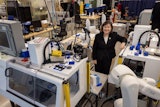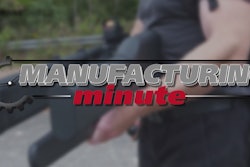In manufacturing, failure costs money, resulting in reduced productivity over time. Integrated technology has become the norm in manufacturing plants, from assembly, forklift transportation, quality control and manager oversight, the demand for tools that can control everything from nearly any location have become vital. While the advent of computers has driven growth in this area, the introduction of mobile devices have allowed managers to perform the same oversight, while staying mobile, something crucial for streamlined productivity and efficiency. However, not all mobile devices are created equal.
Manufacturing enterprises need mobile solutions that will help them perform at a high level consistently throughout the day in harsh work environments. That’s where enterprise-grade mobile devices come in.
Investing in mobile devices in the factory or plant mobile solution requires evaluating more than just the upfront costs. While consumer grade computers may work for certain office-based applications, they’re not designed for the “backbreaking” conditions that many manufacturing professionals encounter daily. Choosing the right mobile device for the job is key to a successful long-term solution.
Device Reliability
An important consideration in selecting the best mobile solution for your organization is having a device that can be used in any environment while still delivering the same level of productivity. Key factors manufacturers now consider include:
- Battery Life: Workers need devices that are equipped to last an entire work shift without recharge to get the most effective use out of your devices. Consider hot swap batteries if operations don’t allow for a full recharge.
- Connectivity: WiFi signals can sometimes be blocked by industrial buildings, large machinery, and other sources of interference and consumer-grade mobile devices will not connect. For this reason, look for devices with customized antennas and modules to maximize wireless performance.
- Hardware Durability/Lifespan: Rugged designs are the way to go in manufacturing. Given the rough environment inherent to mobile devices in manufacturing, its clear managers need mobile devices that can withstand, the spills, drops and damage found in a plant. In addition, rugged mobile solutions should go beyond the standard safety testing to achieve ANSI 12.12.01-2000 certification1. (ANSI 12.12.01-2000 certification testing is used for safe operation in areas where potentially explosive or flammable substances may be present).
- Usability: Most people are familiar with consumer-grade mobile devices in their personal lives and have grown accustomed to that user experience. Now rugged mobile devices are providing that functionality to provide a familiar user experience tailored to the professional’s needs.
- Support Services: Deploying mobile devices in manufacturing plants often requires devices are kitted or customized so they can be used in multiple ways with specific software applications and equipment interfaces — a serial port connection, a forklift mount, secured with encryption. This requires industry expertise and support services familiar with the manufacturing environment. IT decision makers in manufacturing have come to realize this and have turned to rugged device providers who can provide the field engineering expertise and 24/7 support to troubleshoot any potential issue that will arise.
Importance of Maintenance
Maintenance of manufacturing tools and machinery is essential to a production system or plant. Traditionally, maintenance has to be managed in two ways:
- Run to fail – this is when nothing is done until the unit stops running. The unit is then fixed or replaced.
- Time-based method – the unit is checked periodically based on a fixed schedule.
However, increased connectivity within a facility has given rise to condition-based maintenance. This is when a unit is evaluated continuously through a variety of methods, and maintenance operations are performed based on an understanding of how its conditions affect its performance and reliability, triggering maintenance before the unit fails. By deploying an advanced maintenance system like this, organizations can help prevent unplanned downtime and optimize maintenance tasks so that the correct maintenance procedures are done at the right times.
The software that makes predictive maintenance possible, which may be cloud-based or on premise, stores data collected from sensors and environmental conditions and applies rules and history to predict performance issues. It then creates work orders and maintenance schedules to guide technicians via GPS and location information to the units in need of service. But manufacturing environments can be harsh environments, and the machines that run the manufacturing processes can be tough to get to and work on. Often they are wet or oily, in dusty environments and emit RFI.
Operators should combine this software with a rugged mobile device solution that is designed to operate under these adverse industrial, harsh conditions.
New Mobility Applications in the Plant
Additionally, manufacturing facilities are finding new efficiencies by utilizing rugged mobile devices as part of forklift operations. For example, managers can more effectively communicate with forklift operators equipped with a rugged tablet on the arrival of materials and where they need to be delivered, without having to personally interact with the operator. With quality control, if there is an issue on the line, alerts can be delivered in real-time via a mobile tablet to the quality control operator who can bring it to a halt to prevent additional malfunctions. In addition, these rugged devices equipped with quality control software can help oversee inspections and allow managers to get into the nooks and crannies of assembled items in the manufacturing plant, helping prevent failures before the final product leaves the plant.
The bottom line is that consumer devices simply aren’t good enough to perform at the level that most enterprises need from their mobile solutions. Though the price may seem appealing at first, when you consider all factors that go into whether or not a device is appropriate for the work and if it will last, the ROI diminishes more quickly than rugged devices. Investing in a reliable, rugged mobile device reduces downtime and will save enormous costs compared to a personal mobile tablet that won’t work where it is needed or is in need of constant repair. In the long run, researching for a rugged mobile computing solution engineered and designed to perform and meet the specific needs of industrial mobile workers will result in a lower total cost of ownership leading to a greater return on investment.
Jim Dempsey is an Enterprise Business Development Manager at Panasonic.























